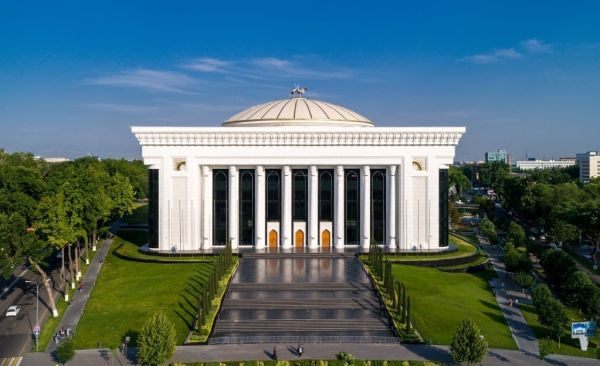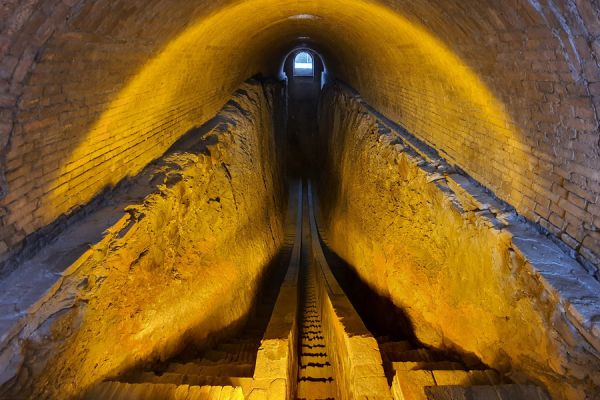In the footsteps of the "Great Silk Road"
A tour in the footsteps of the "Great Silk Road" will introduce you to the most important cities of Uzbekistan. You will see Tashkent, Samarkand, Bukhara and Khiva. It will be an unforgettable journey with visits to the most interesting places visited by such famous generals as Alexander the Great, during the capture of Sogdiana and Bactria, it was then that he married Roxana, the daughter of a local ruler. Genghis Khan founded the Khorezmshah state. And of course Tamerlane — the country is flourishing like never before during this period. The dawn of Astronomy, Medicine, Poetry, Mathematics and many others is taking place. A rich, thoughtful and exciting tour will leave you with a lot of positive emotions.
-
1Meeting of the Guests
Meeting at the place of arrival (airport, train station, checkpoint) Transfer to the hotel (Check-in at 14:00) If you need early check-in, let us know) Overnight at the hotel
-
2Tashkent City Tour
Breakfast at the hotel (Departure with things from the hotel) 10:00 Start of guided tour of Tashkent (by car) We will visit: - Amir Timur (Tamerlane) Square, the Palace of Forums, the Timurid Museum, the Tashkent Chimes, as well as the buildings of European architecture of the XIX century. - Theater Square (A complete architectural ensemble) - Independence Square - Peoples' Friendship Square - Grand Duke Nikolai Romanov's Palace - Tashkent Television Tower (the tallest in Central Asia) - Pilaf Center (Here we will taste the national pilaf and see huge cauldrons in which they cook for the whole city, lunch is included) - Monument "Courage" - Monument to Victims of Repression - Tashkent City (modern park, planetarium, wax museum) - Architectural complex of Khazrati Imam of the XVI century. (Kaffal Shashi Mausoleum, Barak Khan Madrasah, Tillya Sheikh Mosque, Koran Museum (where the only original copy of the Koran is kept, the only one of 6), Hazrati Imam- Chor-su bazaar Cathedral Mosque, gluttony rows (an incredible sight with the opportunity to try everything and even take part in making flatbread in tandoor), (the oldest bazaar and the largest in Central Asia, operating since the 10th century) 18:50-20:58 High-speed train to Samarkand Meeting and transfer to the hotel Overnight at the 3 hotel*
-
3Samarkand City Tour
Breakfast at the hotel. At 10:00 a.m. Meeting with the guide in the hotel lobby, start of the Samarkand city tour (by car) We will visit: - Roman Catholic Church in 1916 (without stopping) - The Ulugbek Observatory, where the preserved part of the sextant of the XV century is still located. (This great scientist devoted his life to science, he was the first to calculate the exact time of the earth's revolution around the sun and built a star map, which was used by the whole world for more than 300 years.) - Shahi-Zinda Necropolis (an ensemble of mausoleums of Samarkand nobility) - Mausoleum of the Prophet Daniel (This prophet ordered to dismember himself after death and place body parts in different corners of the world, the tombstone itself is an impressive 20 meters) - Mausoleum of Sheikh Abd and Darun - The Bibi Khanum Cathedral Mosque (Construction began by order of Amir Timur in 1404, but the construction itself was led by his beloved wife Bibi Khanum, since he was on a campaign. The building far surpassed other buildings, which, according to many sources, angered Amir Timur) - Lunch at the Uzbek national house "Muborak Sharipova" (included), workshops on making Samarkand pilaf are often held here, a falkler show with Uzbek dances is organized - Registan Square of the XV century. (The center of Samarkand since the time of Tamerlane, Ulugbek madrasah, Sher-Dor and Tillya-Kari madrasahs of the XVIII century are located here.) Thanks to craftsmen and architects, they perfectly harmonize and create a unique architectural ensemble. - Siab Bazaar, where you can see the local flavor, buy souvenirs and bargain with local vendors. (Monday off) - Gur-Emir Mausoleum of the 14th-15th centuries. (tombs of Tamerlane and members of the Timurid dynasty) - Visit to the artisan center (here you will visit a workshop for making suzane, a boutique for sewing stylish clothes from Uzbek fabrics in which you can take pictures, embossing, gold painting on ceramic products, and many others). 21:03 – 22:34 High-speed train to Bukhara Meeting and transfer to the hotel Overnight at the 3 hotel*
-
4A trip around Bukhara
Breakfast at the hotel. At 10:00, meeting with the guide in the hotel lobby, the beginning of the Bukhara city tour (walking tour) We will visit: - Samanid Mausoleum (late 9th—early 10th century) The earliest monument in Bukhara is the Mausoleum of Chashma Ayub (12th—16th centuries There is a legend connected with the holy spring inside the mausoleum, according to which the biblical prophet Job (Ayub) broke the way to the water with his staff in a dry year and thus saved the Bukharians from death - the Bolo House Complex (XVIII—XX centuries). Unusual in its beauty, the Friday mosque for the nobility who lived in the Ark fortress - Ark Fortress (1st century BC For centuries, the fortress served as the residence of the Bukhara emirs, in which the entire family of the emir lived permanently, the official apparatus was located, as well as the zindan, the harem and the treasury - the Kalyan Mosque (XVI century.) The Cathedral Friday mosque of Bukhara - the Kalyan Minaret (1127) One of the three buildings in Bukhara that survived after the invasion Genghis Khan. In ancient times, the minaret served as a lighthouse for caravans - The current Miri Arab madrasah (XVI c.) Ahmad Kadyrov studied here - Abdullaziz Khan Madrasah (XVII c.) One of the most beautiful monuments of Bukhara, the portal of which is decorated with painted stalactites - Ulugbek Madrasah (XV c.) - Lunch will be held at the national restaurant in the city center (included) - A walk under the trading domes (XVI century) of Toki Sarrafon (dome of money changers), Toki Telpak Furushon (dome of sellers of hats), Toki Zargaron (dome of jewelers), under which there are, as many centuries ago, many handicraft and souvenir workshops. - Caravanserais of Bukhara - Magoki Attari Mosque (XII—XVI centuries) is the oldest mosque in Bukhara, the facade of which is decorated with elaborate terracotta carvings. Fragments of an older temple of fire worshippers were found under the foundation of the mosque - the Craft center of Bukhara in the Sayfiddin caravanserai - the Lyabi House Ensemble. You will see the monument to Khoja Nasreddin, the central square of Bukhara with an ancient pond, the most favorite place of recreation for citizens and guests of our city. Khanaka (monastery of the dervishes) (XVII c.) and Nodir Divan Begi madrasah (XVII c.), Kukeldash madrasah (XVI c.) After the tour, you will have time to walk around evening Bukhara, visit the Hammam, and enjoy dinner in national restaurants. 23:00 Transfer to the railway station 00:37-07:10 Train to Khiva (coupe class) Overnight on the train
-
5A trip to Khiva
07:10 Meeting at the railway station and transfer to the hotel for breakfast and leave your belongings (check-in at the hotel after the tour) At 09:00 Meeting with the guide and starting the tour in Khiva (walking tour) We will visit: - Ichan-kala fortress, the main western gate of Ata-Darvaza opens the entrance to the Ichan-kala fortress. The fortress wall hides a city with ancient buildings, streets, palaces. Kunya Ark (XVII-XVIII centuries) - An old citadel, a kind of "city within a city" was built under Arang Khan, there were a palace, a mint, a harem, mosques, stables, an arsenal, a prison-zindan, which functioned until the end of the XIX century - Muhammad Aminhana Madrasah (1852-1853) - Kalta Minaret-Minar (1854-1855) An unusual minaret completely covered with glazed tiles, according to the ambitious plan of the ruler of Khiva, was supposed to outshine all existing minarets in the world with its beauty and size, but it was only half built, which is why it got its name "kalta" — short - Muhammad Rahim Khan Madrasah (1876) - Said Alawaddin Khanaka Mausoleum (XIV, XIX centuries) Built on the burial site of the famous Sufi sheikh - Pahlavan Mahmud Mausoleum (XVIII-XIX centuries) - Islam Khoja Minaret and Madrasah (1908) The most beautiful and tallest minaret of Khiva stands proudly above the ancient urban buildings - Lunch at a national restaurant (included) - Juma Mosque (X-XVIII c.) The Cathedral Friday mosque of Khiva is notable for the fact that it contains unique carved columns, some of them more than 1000 years old - Ak Mosque (1657) and baths of Anush Khan (1664) - Kutlug-Murad-Inak Madrasah (1804-1812) - Alla-Kuli Khan Madrasah (1832-1835) - Tash-Khauli Palace (1830-1838) The "stone" palace was a large complex consisting of eight courtyards and 163 rooms, similar to a maze. There were a palace, a harem, a court of entertainment, as well as other premises - the Palvan Kari Complex (1905), the caravanserai and the Alla Kuli Khan museum (1835), Both buildings: the caravanserai and the Palvan Kari bazaar, designed to improve trade and attract as many merchants as possible to the capital of the khanate, were located at the Palwan Darwaza gate. Tim is still considered the largest indoor market in Khiva. Thick walls provide refreshing coolness on a hot day, and words of gratitude to skilled builders often resound under the arches of an ancient building - the Palvan-Darvaza Gate (1806) Literally, the "heroic" gate, but were also known by other names: Poshshob-darvaza (gate of the executioners); Kul-darvaza (slave gate). These names are related to the fact that until 1873, a slave market was located at the Palvan Darvaza gate, at the exit from Ichan-kala.; and all the decrees on executions emanating from the Tash-khauli palace were announced at these gates of the city. Overnight at the 3 hotel*
-
6Let's go back home!
Breakfast at the hotel (check-out at 12:00) Transfer to Urgench airport for your flight or to the railway station *(If you have a flight from Tashkent, we can help you buy railway tickets or flights to Tashkent)
-
The main cities of the route: The tour covers the key cities of Uzbekistan that played an important role in the history of the Great Silk Road: Tashkent is the capital of Uzbekistan, a modern metropolis with a rich history and culture. Samarkand is one of the oldest cities in the world, known for its architectural masterpieces such as Registan and the Ulugbek Observatory. Bukhara is an open—air museum city, where unique monuments of Islamic architecture have been preserved. Khiva is an ancient fortress city, included in the UNESCO World Heritage List, with its famous Ichan Kala.
-
Historical significance: Alexander the Great visited these lands during the conquest of Sogdiana and Bactria, where he married Roxana, the daughter of a local ruler. Genghis Khan played an important role in the history of the region, founding the Khorezmshah state. Tamerlane (Amir Timur) made Samarkand the capital of his empire, which led to the flourishing of science, art and architecture in the region.
-
Cultural heritage: The tour offers a unique opportunity to explore the rich cultural heritage of Uzbekistan: the dawn of astronomy, medicine, poetry and mathematics in the Timurid era. Visit ancient madrassas, mosques and bazaars that have preserved the spirit of the Great Silk Road.
-
Travel convenience: The opportunity to travel on modern high-speed trains, which makes the tour comfortable and convenient. A well-thought-out itinerary that includes both historical excursions and scenic walks such as the mountains and Lake Charvak.
-
Emotional component: This tour promises to be unforgettable thanks to a rich program that combines history, culture and natural beauty. You will get a lot of positive emotions and impressions from exploring Uzbekistan, the crossroads of the Great Silk Road.























